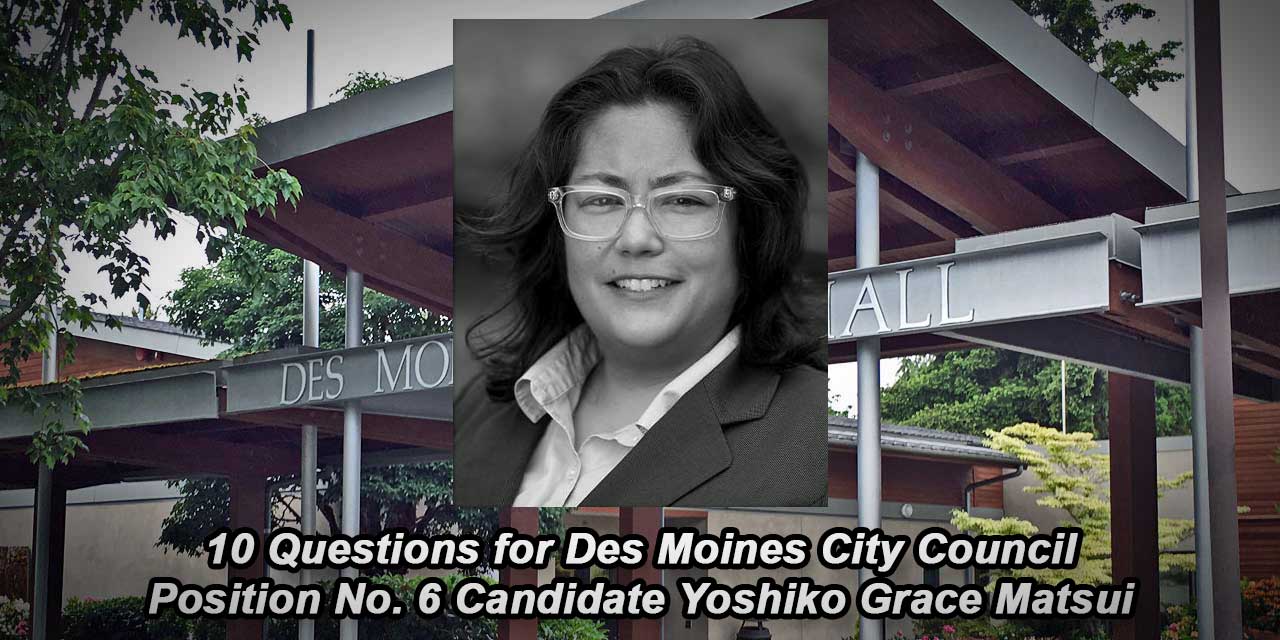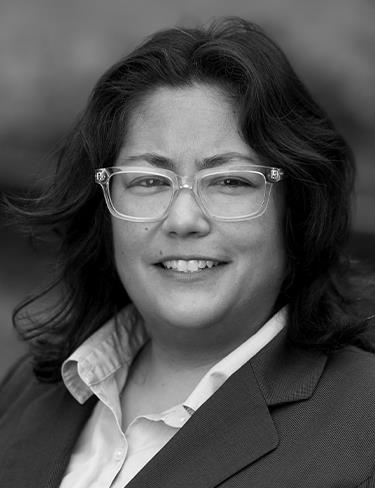EDITOR’S NOTE: We did not receive replies to our 10 Questions asked of Des Moines City Council Position No. 4 Candidates Jeremy Nuttng nor Christine Puzas, so we are skipping ahead to Position No. 6 Candidate Yoshiko Grace Matsui:
Each candidate running for the Des Moines City Council Nov. 7, 2023 General Election was asked 10 questions by The Waterland Blog, covering topics like their reasons for wanting to serve on the council, what they think about current issues in the city, and what kind of solutions they have.
The following responses to our questionnaire in our series is from Des Moines City Council Position No. 6 candidate Yoshiko Grace Matsui, who is running unopposed.
Ballots will be mailed out on Oct. 18, and are due by 8 p.m. on Tuesday, Nov. 7, 2023.
NOTE: Photos, links and the order of how candidates are presented are identical to the King County Elections website.
Yoshiko Grace Matsui
1. Why are you running for city council? Please explain what inspired you to run and why you are qualified.
“I have worked in public service most of my adult life. The value of giving back to my community was instilled in me by my mom at a young age.
“As a child, I remember working at the food bank on Capitol Hill and serving lunch to those in need. That spirit of service led me to pursue a master’s degree in education at Western Washington University. I worked for more than a decade in higher education, supporting college students in residential life and student activities. I later moved into the field of Human Resources and accepted a position at the City of Seattle. One of the most rewarding aspects of working for the City is the mission-driven work; my job contributes to the community by supporting the staffing needs of the Seattle Fire Department. Seattle Fire is a critical resource, responding to more than 100,000 calls for service in 2022. I’m proud to work with our Firefighters every day.
“That spirit of service and a clear sense of mission is a passion I bring to working in Des Moines. I became an elected Commissioner for King County Water District No. 54 in 2015. I’ve volunteered for community organizations and served on the Des Moines Waterfront Farmers Market Board. My qualifications include my passion for this work, experience in government, and a spirit of service.
2. What are the three biggest issues facing Des Moines residents, and how can they be solved?
“Public safety is a considerable concern in conversations with residents in Des Moines. There is an increasing feeling that Des Moines doesn’t feel as safe anymore. Whether it’s property crime such as stolen mail, car theft, vandalism, or unsafe drag racing and loud mufflers, addressing these issues is essential. Des Moines must be a safe place to raise your family or enjoy your home in your retirement. I will push for permanent funding for the two police officers who are currently grant-funded. Additionally, we need increased support for our Getting People Services team to handle issues that don’t require law enforcement.
“The lack of arts and cultural events and general recreational opportunities is a second issue. A vibrant community has a “vibe” – whether it’s a slate of lectures, art shows, concerts or family activities. Too often, our City and its civic organizations are at odds rather than working in collaboration. Working together can improve the quality and quantity of recreational opportunities in Des Moines.
“Residents are also concerned about needed improvements to our City’s infrastructure. This item is probably the least attractive on the list, but comes up repeatedly. Whether it’s a lack of sidewalks on stretches of Kent Des Moines Road or aging City facilities – capital projects and public works are a strong interest to me.
“Construction costs are astronomical, but we cannot defer needed upgrades. I strongly believe in the fiscally responsible practice of “one-time money for one-time costs,” which means using grants and federal programs to upgrade and enhance capital projects.”
3.What are your thoughts on local crime and the job the Des Moines Police Department is doing?
“Crime is a significant issue in our community and region. I firmly believe our Des Moines Police Department is doing its best with the available resources. While the police must focus on law enforcement, we, as a community, must be encouraged to help reduce the risk by increasing the Neighborhood Block Watch program. The City can also assist with a program similar to SeaTac’s to upgrade locking mailboxes in an effort to reduce or prevent mail theft.
4. What is your opinion on how City Manager Michael Matthias is doing?
“I can only speak from my impressions and experiences as a community member. Most of his highlighted accomplishments have focused on his fiscal management. While I appreciate that the City budget is temporarily stabilized, we as a community don’t acknowledge enough the route it took to get here.
“To generate revenues, the City Council established “franchise fees.” Franchise fees are levied mostly on utilities such as cable, water, sewer, electric, and cell phone service. Just before the City Manager arrived, these fees went into effect. The City Manager took advantage of that new tool to balance the budget.
“The City instituted fees close to 7 percent on each of our bills. Puget Sound Energy, for example, doesn’t absorb this cost. It passes it right on to you. In looking at my September PSE bill, $10.54 goes directly to the City of Des Moines.
“My concern is that this system is primarily regressive – lower wage earners pay more of their income in fees than the more affluent. So, while the finances of the City improved, the franchise fee revenue stream is not one I support.
“Regarding communication, I must give the City Manager lower marks. Other cities have weekly published reports on the Manager’s actions and priorities. Mr. Matthias ceased writing these reports and instead only delivers verbal remarks at City Council meetings. This limits the opportunity for residents to become informed and involved.
“Calls for improved communications and outreach from the community, including calls for a new City website have been back-burnered or ignored. Communication is a vital function of government – we must explain how we are stewards of the City and how our priorities and actions are conceptualized.
“Mr. Matthias has been a polarizing and divisive figure for the civic and community organizations in Des Moines.
“In a time with limited resources in a small city, we need leadership that brings people of different views together, not deepens conflicts.”
5. How do you think the City is handling issues regarding airplane noise and pollution from Sea-Tac Airport?
“My answer is simple – we are not getting our fair share of resources from the Port of Seattle to counter noise and pollution impacts. The health impacts of airport operations are so detrimental the Port tried to suppress an internal report that confirmed the alarming findings of an evidence-based, scientific study. Only through citizen activism was the internal report released and brought to light.
“The document confirms that research by the University of Washington is correct – that those living closest to the airport have higher rates of heart disease, higher rates of premature births, and perhaps most concerning – a lower life expectancy than residents who live more than 5 miles away. We need to step up the pressure to seek assistance for noise monitoring, port packages, and advanced air filtration systems. The Port has the resources – its estimated revenue in 2023 is nearly $1 billion dollars. We must demand proper mitigation measures to make Des Moines a healthier place to live.
6. What are your thoughts on building a hotel near the Des Moines Marina?
“Our marina is a gem to our residents and visitors alike. I understand the City is looking for economic growth opportunities, but losing control of our beautiful marina to a sale or long-term lease means that residents will be saddled with more noise, traffic, and competition to use our public space. If done right, Marina development can be an economic engine in this area. I do not favor giving prime space in the North parking lot to hotel developers. When the City gives up property rights, we give up local control, and that’s unacceptable.”
7. What are your thoughts on the passenger ferry pilot program?
“Like many residents, I have conflicting thoughts. Again, the drive behind the ferry is economic development. A bustling marina means more tourists and more amenities for residents as well. I rode the ferry on opening day in 2022, and it was a lovely voyage. However, I have deep concerns about continuing this pilot project.
“One of my greatest concerns is the cost.
“While once touted as a potential private/public partnership – we taxpayers are footing the bill alone. I don’t believe the ferry is sustainable without significant private investment. In fact, the City is currently using “one-time money” to fund the ferry, which nearly all council members claim they don’t support in practice.
“Until the City has a plan for financially making the ferry pencil out, I don’t know if it can succeed.”
8. Do you have any ideas on how to help Des Moines businesses that are struggling with recent issues, like COVID or increasing crime?
“We can debate about state laws and what needs to be addressed by the Legislature, but on a daily basis, we need tactics and strategies that work right now. We should focus on actions we can apply now, and in a recent ride-along with the Des Moines Police Department, I was really impressed by the focus on environmental design. That’s a crime reduction strategy that often works and can be reviewed and adopted by businesses now. One example is increased lighting in areas with high foot traffic on Pacific Highway.
“While it has limitations, officers say it makes a difference in loitering and littering.
“We also can support local businesses by banding together to share these successful strategies. I was very heartened to hear the Police department is working with owners and operators on the highway to encourage crime reduction measures.”
9. How would you change recent issues having to do with the “boil water” advisory or ongoing sewage spillages in Des Moines?
“This topic is close to my heart as I’ve advocated for the utility districts for quite some time. I was elected a Commissioner at Water District No. 54 in 2017 and am deeply familiar with our challenges. We are at a crossroads when it comes to upgrading aging infrastructure. Construction costs are astronomical, and material or staffing storages have sometimes disrupted much-needed maintenance. There is significant intervention needed on the part of the federal government to assist with capital projects. While Congress’ bi-partisan Infrastructure Deal is a great accomplishment, competing for federal funding is difficult. Often, small jurisdictions compete with the cities of Seattle or Tacoma for the same funding pool. The City of Des Moines had an opportunity with the American Rescue Plan Act (ARPA) funds to invest in capital projects with the five utilities serving our community.
“This aligns with their stated fiscal policy of using “one-time money” (in this case, ARPA funds) for “one-time costs” (capital projects). Unfortunately, special-purpose districts such as Midway Sewer and Water District No. 54 are not eligible to receive ARPA funds directly – leaving City or County governments in control of funding priorities. As a result, not one of the special purpose districts serving Des Moines received any of the $9 million in ARPA funds for needed improvements to infrastructure. Here’s where that decision is short-sighted. The City needs reliable water and sewer service to attract new residents and businesses. We are all in this together and must work collaboratively to achieve our goals. I was grateful for the tone and tenor of outgoing Councilmember Vic Pennington while developing our “After Action Report” following this summer’s boil water advisory. He led a multi-agency team to reflect on the lessons learned and how we can be better partners in the future. Supporting our utilities needs to be a higher priority for the City, not just the utilities themselves.
10. How would you balance the needs and interests of different neighborhoods and communities in Des Moines?
“Addressing neighborhood-specific issues is a tricky balancing act that all elected officials must undertake. I prefer a “hands-on” approach and to hear directly from residents in different neighborhoods. I hear some common themes, including those I listed above. I believe the Citizens Advisory Committee may become a good resource for collecting data so the council can make informed decisions impacting our residents daily.
“I have often considered whether our neighborhoods might be better served if our city council were elected by districts, meaning each district would vote on their choice of representative instead of all Councilmembers being at-large. Neighborhoods may have unique needs, and having your council member be directly accountable to the voters of their district can be a benefit. Campaigning in a district is also more accessible and cost-efficient, which may also increase the pool of candidates. But in the meantime, I will continue seeking community input and integrating those voices into my decision-making.”




Yoshiko has incredible foresight and knowledge about public service needs due to her many years of experience in important city government positions and dedication to community service organizations. Bravo Yoshiko for taking on this local city council leadership position. Des Moines will be a better place with your insights and commitment.